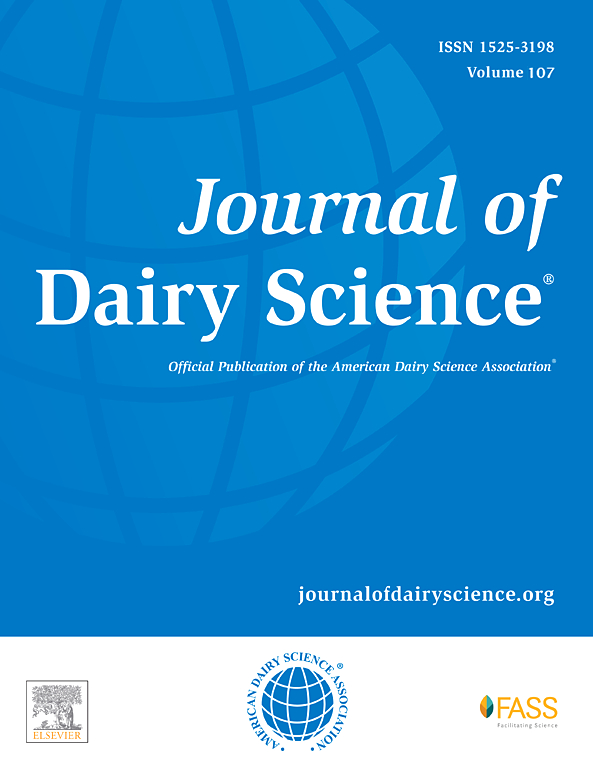探索牧场主健康和福利与奶牛场亚临床乳腺炎发病率和生产率之间的纵向关联:挪威 HUNT 研究。
IF 4.4
1区 农林科学
Q1 AGRICULTURE, DAIRY & ANIMAL SCIENCE
引用次数: 0
摘要
农民的健康和福祉是农业可持续发展的一个方面,牲畜的健康和生产力也是如此。以往的研究表明,这两者之间可能存在关联,但农民与牲畜之间关系的复杂性可能会阻碍研究工作。这项观察性研究利用来自挪威乳制品企业的高质量现有调查和登记数据,探讨了牧场主的健康和福利(一般健康、慢性疾病或状况、慢性疼痛、焦虑或抑郁症状或生活满意度低)与奶牛群乳房健康(按体细胞数(SCC)高的牛奶检测比例估算)或产奶量(每头牛年当量公斤数)的变化之间可能存在的纵向联系。我们发现有证据表明,牧场主健康或福利状况不佳时,SCC%普遍呈上升趋势。与健康状况良好的牧场主相比,如果牧场主自我报告的总体健康状况较差,企业 SCC% 增加一年的几率比(OR)为 1.51(95% CI:0.76,2.99,调整可能的效应调节因子后的几率比为 1.80(0.71,4.51));如果生活满意度较差,几率比为 1.50(0.71,3.15)(调整后为 2.61(0.92,7.39))。我们还发现,与其他企业相比,牧场主健康或福利状况不佳的企业产奶量下降的几率往往较低。患有任何慢性疾病或状况的牧场主一年内产奶量下降的 OR 值为 0.42 (0.24,0.76),患有焦虑或抑郁症状的牧场主一年内产奶量下降的 OR 值为 0.56 (0.23,1.34)。本文讨论并探讨了潜在的混杂因素和效应调节因素。这些结果表明,需要进一步开展纵向研究,以揭示农民健康和福祉与牲畜健康和生产率之间的关系。本文章由计算机程序翻译,如有差异,请以英文原文为准。
Exploring longitudinal associations between farmer health and well-being and dairy herd subclinical mastitis prevalence and productivity: The HUNT Study, Norway
The health and well-being of farmers is one aspect of the sustainability of agriculture, as is the health and productivity of livestock. Previous research suggests a possible association between the two, but the complexity of the relationships between farmers and their livestock can hamper research efforts. This observational study uses high quality existing survey and register data from a cohort of Norwegian dairy enterprises to explore possible longitudinal associations between farmer health and well-being (general health, chronic disease or condition, chronic pain, anxiety or depression symptoms, or poor life satisfaction) and changes in dairy herd udder health (estimated by the proportion of milk tests with a high somatic cell count [SCC%]) or milk yield (kg/cow-year Eq). We found evidence of a general trend toward increased SCC% with poor farmer health or well-being. If the farmer had poor self-reported general health, the odds ratio (OR) for a 1-yr increase in SCC% at the enterprise was 1.51 (95% CI: 0.76, 2.99) and 1.80 (0.71, 4.51) after adjustment for possible effect modifiers, compared with those with good health, and for poor life satisfaction the OR was 1.50 (0.71, 3.15) and 2.61 (0.92, 7.39) after adjustment. We also find evidence that enterprises where a farmer was experiencing poor health or well-being tended to have lower odds of a decrease in milk yield than other enterprises. The OR for a 1-yr decrease in milk yield with any chronic disease or condition was 0.42 (0.24, 0.76), and with symptoms of anxiety or depression the OR was 0.56 (0.23, 1.34). Potential confounders and effect modifiers are discussed and explored. These results suggest that further longitudinal research to unravel the relationships between farmer health and well-being, and livestock health and productivity is needed.
求助全文
通过发布文献求助,成功后即可免费获取论文全文。
去求助
来源期刊

Journal of Dairy Science
农林科学-奶制品与动物科学
CiteScore
7.90
自引率
17.10%
发文量
784
审稿时长
4.2 months
期刊介绍:
The official journal of the American Dairy Science Association®, Journal of Dairy Science® (JDS) is the leading peer-reviewed general dairy research journal in the world. JDS readers represent education, industry, and government agencies in more than 70 countries with interests in biochemistry, breeding, economics, engineering, environment, food science, genetics, microbiology, nutrition, pathology, physiology, processing, public health, quality assurance, and sanitation.
 求助内容:
求助内容: 应助结果提醒方式:
应助结果提醒方式:


